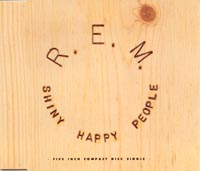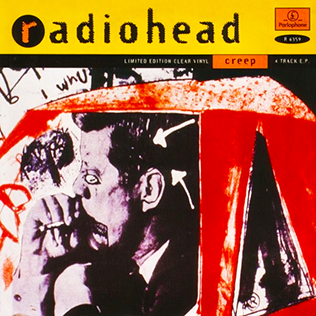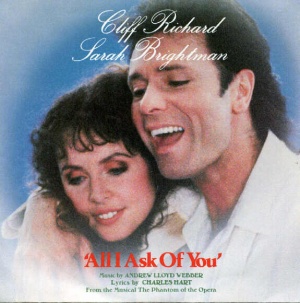Related Research Articles

"Shiny Happy People" is a song by the American rock band R.E.M., released as the second single from their seventh studio album, Out of Time (1991). It features guest vocals by Kate Pierson of the B-52's, who also appears in the music video.

"Creep" is the debut single by the English rock band Radiohead, released on 21 September 1992. It was included as the second track of Radiohead's debut album, Pablo Honey (1993). It features "blasts" of guitar noise by Jonny Greenwood and lyrics describing an obsessive unrequited attraction.

"Run to the Sun" is a song by English synth-pop duo Erasure, released in July 1994 by Mute and Elektra as the second single from the duo's sixth studio album, I Say I Say I Say (1994). The song is written by Vince Clarke with fellow Erasure member Andy Bell and is an uptempo dance music track that displays signature synthesizer programming by Clarke. The UK 7-inch single of "Run to the Sun" was issued on yellow-coloured vinyl and featured a fold-out poster of the single's cover artwork. The single's B-side, a ballad entitled "Tenderest Moments", was later re-recorded by Erasure in an acoustic version for their 2006 album Union Street.

"I Want You" is a song by Australian pop duo Savage Garden, originally released in Australia on 27 May 1996 as the lead single from their eponymous debut album, Savage Garden (1997). The single reached number one in Canada and peaked at number four in Australia and on the US Billboard Hot 100. Much of the song's chart success in the US was the result of Rosie O'Donnell playing the song on several episodes of The Rosie O'Donnell Show. In the United Kingdom, the single was issued twice, achieving its highest peak of number 11 during its initial release in 1997.

"A Million Love Songs" is a song by English boy band Take That that appeared on their debut studio album, Take That & Party (1992). The song was written by lead vocalist Gary Barlow. It was released in the United Kingdom on 28 September 1992 by Sony Music and peaked at number seven on the UK Singles Chart that October. It also reached number 50 in the Netherlands.

"A Life Less Ordinary" was a non-album single released by the band Ash on 13 October 1997. It was the title track of the film of the same name, A Life Less Ordinary, starring Cameron Diaz and Ewan McGregor, and also appeared on the film's soundtrack. The single was released in three formats: CD, 7-inch vinyl, and cassette. The limited-edition 7-inch was printed on blue vinyl. The song peaked at number ten on the UK Singles Chart.

Phyllis Hyman is the self-titled solo debut studio album by American soul singer-songwriter Phyllis Hyman. It was released by Buddah Records in 1977. The album charted at number 107 on the Billboard 200 chart.

"All I Ask of You" is a song from the 1986 English musical The Phantom of the Opera, between characters Christine Daaé and Raoul, originally played on stage by Sarah Brightman and Steve Barton, respectively. It was written by Andrew Lloyd Webber, Charles Hart and Richard Stilgoe, and solely produced by Lloyd Webber. An operatic pop piece, its lyrics serve as dialogue between the two characters and discuss themes such as commitment and romance. Like Lloyd Webber's song "The Music of the Night", "All I Ask of You" was compared to the music found in Giacomo Puccini's 1910 opera La fanciulla del West.

"How Can You Expect to Be Taken Seriously?" is a song by English synth-pop duo Pet Shop Boys from their fourth studio album, Behaviour (1990). It was released in the United Kingdom on 11 March 1991 as a double A-side with "Where the Streets Have No Name ", serving as the third single from Behaviour. For the single, Brothers in Rhythm remixed the track. The track was subsequently released as a solo single in the United States and France; it peaked at number 93 on the US Billboard Hot 100. As "Being Boring" and "It's Alright" were not released in the US, tracks from these releases were used on a number of US releases. The accompanying music video received heavy rotation on MTV Europe.

"Silence Is Easy" is the first single from the album of the same name by British pop band Starsailor. The song reached number nine on the UK Singles Chart, which is the band's highest position on the UK chart. The song also reached number 40 in Ireland and number 70 in the Netherlands. It was one of two songs on the album that was produced by Phil Spector.
"How Do I Deal" is a song by American actress Jennifer Love Hewitt from the soundtrack to the film I Still Know What You Did Last Summer. The song was released as a single on November 17, 1998, with an accompanying music video. The single became Hewitt's one and only appearance on the US Billboard Hot 100 singles chart, peaking at number 59 in a seven-week run. Although not a big success in America, the single reached number five in New Zealand and peaked at number eight in Australia, where it is certified gold.
"Are You Ready for Love" is a song recorded by English musician Elton John in 1977 and first released in the UK in 1979 as the first single from the EP The Thom Bell Sessions. It was written by LeRoy Bell, Thom Bell and Casey James, and was originally produced in Philadelphia by Thom Bell, who had already produced a series of hits for the Spinners, the Delfonics and the Stylistics. While the song "Mama Can't Buy You Love" from the EP charted in 1979, this song and the other track on the three-track 12-inch vinyl disc, "Three Way Love Affair", were only minor footnotes at the time. The song originally peaked at number 42 on the UK Single Charts in 1979.

"High Enough" is a song by American supergroup Damn Yankees from their self-titled debut album. A power ballad, it is their most successful single in terms of chart position and sales, rising to No. 3 on the US Billboard Hot 100 chart, the group's first top-ten pop single. It also reached No. 2 on the US Mainstream Rock Tracks chart. The success of "High Enough" helped send its parent album into the top 20 on the US albums chart.

"Where the Streets Have No Name (I Can't Take My Eyes Off You)" is a song by English synth-pop duo Pet Shop Boys. The song is a medley of U2's "Where the Streets Have No Name" and "Can't Take My Eyes Off You", a 1967 song by Frankie Valli, though in an arrangement informed by the 1982 disco version of the song by the Boys Town Gang rather than the original. The song accompanied "How Can You Expect to Be Taken Seriously?", the third single from their fourth studio album, Behaviour (1990), as a double A-side in the United Kingdom (both singles were released separately in the United States). Released in March 1991 by Parlophone, the song became the duo's 15th consecutive top-20 entry in the UK, peaking at number four on the UK Singles Chart.
Anargyros "Silver" Koulouris is a Greek musician best known for his membership in the band Aphrodite's Child, in which he played lead guitar. He has also performed session work on a plethora of albums by other artists, including those of his former Aphrodite's Child bandmates, throughout the 1970s and 1980s, and in recent decades he has released solo recordings under his own name.

"Forever and Ever" is a song by Greek singer-songwriter Demis Roussos from his second studio album, Forever and Ever (1973).
"Happy to Be on an Island in the Sun" is a song by Greek singer Demis Roussos. It was released as a single in 1975.
"Because" is a song by Greek singer Demis Roussos. It was released as a single in 1977.
"Kyrila" is a song by Greek singer Demis Roussos. It was released as a single and as an EP in 1977.

"Quand je t'aime" is a 1987 song in French by Greek singer Demis Roussos. Written by Didier Barbelivien with music composed by Pascal Auriat, it was released as a single in December 1987 and was part of Roussos' 1988 studio album Le Grec. It had success in France, becoming a top-three hit.
References
- 1 2 Can't Say How Much I Love You (UK 7-inch single liner notes). Demis Roussos. Philips Records. 1976. 6042 114.
{{cite AV media notes}}: CS1 maint: others in cite AV media (notes) (link) - ↑ Can't Say How Much I Love You (French 7-inch single liner notes). Demis Roussos. Philips Records. 1976. 6042 121.
{{cite AV media notes}}: CS1 maint: others in cite AV media (notes) (link) - ↑ Happy to Be... (LP, Vinyl). Righeira. Philips Records. 1976. 9120 088.
{{cite AV media notes}}: CS1 maint: others in cite AV media (notes) (link) - ↑ "Demis Roussos – Can't Say How Much I Love You" (in French). Ultratop 50. Retrieved 11 April 2023.
- ↑ "Charts singles Top 50 en France: 16 Mai 1976". 2017.
- ↑ "Demis Roussos: Artist Chart History". Official Charts Company. Retrieved 11 April 2023.